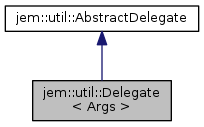|
Jive reference manual
|
|
Jive reference manual
|
Represents a call-back function that will be invoked by an event. More...
#include <jem/util/event/Delegate.h>

Public Types | |
| typedef Args | Arguments |
| A struct that bundles the arguments of an event. More... | |
Public Member Functions | |
| virtual void | call (const Arguments &args)=0 |
| Invokes the call-back represented by this object. More... | |
| virtual bool | isConnected () const =0 |
| Tests whether the call-back represented by this object still exists. More... | |
 Public Member Functions inherited from jem::util::AbstractDelegate Public Member Functions inherited from jem::util::AbstractDelegate | |
| virtual bool | equals (AbstractDelegate *rhs) const =0 |
| Tests whether this delegate is equal to another delegate. More... | |
Protected Member Functions | |
| virtual | ~Delegate () |
| Protected destructor. More... | |
 Protected Member Functions inherited from jem::util::AbstractDelegate Protected Member Functions inherited from jem::util::AbstractDelegate | |
| virtual | ~AbstractDelegate () |
| Protected destructor. More... | |
The Delegate class represents a call-back function that is invoked by an Event object. The template parameter Args is a class that bundles the arguments of an event. This parameter equals the Arguments type defined by the event to which a Delegate is connected.
The Delegate class essentially provides two public functions: call() and isConnected(). The first is called when the emit() function is invoked on the event to which a delegate has been connected. The second is called by an Event to test whether a Delegate is still useable. If this function returns false, the Delegate will be deleted.
If you want to implement your own delegate type, you should take the following steps: define a class that is derived from the Delegate class; implement the call() and isConnected() member functions; and implement a non-member function that creates an instance of your class and that connects this instance to an event. The following example illustrates these steps for a delegate type that encapsulates a call-back function with a single argument.
Event | typedef Args jem::util::Delegate< Args >::Arguments |
|
protectedvirtual |
The destructor of the Delegate class is declared protected because only an Event should be able to delete an instance of the Delegate class. This is to avoid situations in which an Delegate is deleted more than once.
Classes derived from the Delegate class should also declare their destructor protected.
|
pure virtual |
Invokes the call-back function represented by this Delegate object. The call member function by the emit member function of the Event class. The argument args is a simple struct that bundles the arguments of the emit function. This struct has the following members:
ARGUMENT_COUNT - a static member of type const int that equals the number of arguments that were passed to the emit function.first - a copy of the first argument passed to the emit function. This member only exists when emit was called with one or more arguments.second - a copy of the second argument passed to the emit function. This member only exists when emit was called with two or more arguments.third - a copy of the third argument passed to the emit function. This member only exists when emit was called with three arguments.Note that you do not have to test explicitly whether the members first, second and third exist; the compiler will emit an error if you try to use a non-existing member.
| args | - a struct bundling the arguments of the emit function of the Event class. |
|
pure virtual |
Tests whether the call-back function represented by this Delegate object still exists. If, for instance, this Delegate represents a non-static member function of some object, then this function should return false if that object has been deleted, and true otherwise.
This function is called by an Event to test whether a Delegate is still useable. If this function returns false, then the Delegate will be deleted.
true if the call-back represented by this object still exists, and false otherwise. Implements jem::util::AbstractDelegate.